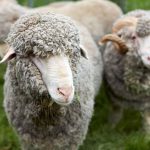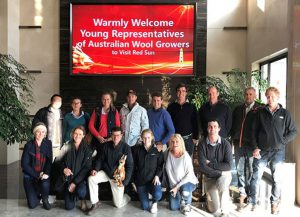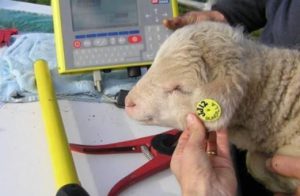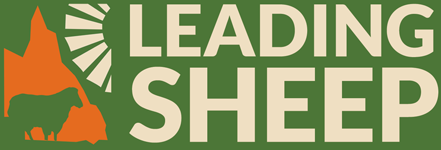- New drench resistance test trial begins
- Young Queenslanders perspective on China wool tour
- EIDs – your pathway to profitable selection
- Rubbing sheep – lice or not?
- Upcoming events
- eBulletins
1. New drench resistance test trial begins
 Get involved: A trial testing different drench resistance test methods is currently under way. Funded by Australian Wool Innovation (AWI) and conducted by Dawbuts, the free trial is now calling for woolgrowers to get involved.
Get involved: A trial testing different drench resistance test methods is currently under way. Funded by Australian Wool Innovation (AWI) and conducted by Dawbuts, the free trial is now calling for woolgrowers to get involved.
Australian sheep producers spend an estimated $93 million per year on sheep drenches. However most of the time, they don’t know if the drench is working. One of the reasons why farmers do not drench test is because the traditional test is based on low-sensitivity counts that require a mob average of 300 epg before it can begin. This may be hard to achieve, especially if the sheep are being managed for low worm burdens. The second problem is that leaving sheep until they have higher worm burdens exposes them to the risk of sickness and low production.
There is no cost for participating in this trial. Plus you will find out what drenches and combination of drenches still work on your property. Click here for more information or if you want to get involved please contact Dawbuts on admin@dawbuts.com.
2. Young Queenslanders perspective on China wool tour
 Three young Queensland woolgrowers have returned from a tour of China with a global perspective of their industry. Felicity Brumpton, Tom Perkins and Amy Macintosh, along with a number of other growers from across Australia visited China’s biggest manufacturers of raw wool and gained a greater understanding of the journey Australian wool takes once exported. The self-funded trip organised by Australian Wool Innovation (AWI) involved visits to a number manufacturers within the trade and meetings with key AWI/Woolmark staff based in Asia.
Three young Queensland woolgrowers have returned from a tour of China with a global perspective of their industry. Felicity Brumpton, Tom Perkins and Amy Macintosh, along with a number of other growers from across Australia visited China’s biggest manufacturers of raw wool and gained a greater understanding of the journey Australian wool takes once exported. The self-funded trip organised by Australian Wool Innovation (AWI) involved visits to a number manufacturers within the trade and meetings with key AWI/Woolmark staff based in Asia.
Comments from the Queensland participants:
Felicity Brumpton ‘Mt Ascot’ Mitchell
After shearing, we put the wool on the truck for the sales and thats the last we see of it, so being able to see the other side of the supply chain was something that had always interested me.
I think the biggest thing I got out of the trip was seeing the confidence that the Chinese had in the future of the wool industry. This gives us great hope and encourages everyone to grow more wool. It was also interesting to hear that the processors aren’t too worried about the prices they have to pay for wool, instead they would like to see fewer fluctuations in the market.
Any young person involved in the wool industry should consider going on this trip as it puts the Australian wool industry into perspective and how the demand for wool as a natural fibre is significantly increasing. There aren’t a lot of young Queensland woolgrowers compared to other states, so an opportunity like this would allow you to see all of the potential benefits that Merino wool has to offer which is advantageous for a state where growing wool is our main focus.
Tom Perkins ‘Nelyambo’ Dirranbandi
Prior to this trip I had little knowledge of the manufacturing process of wool and to see this first hand was an amazing process. In particular the plant at Nanshan where we were able to see ‘greasy wool go in and a woolen suit come out the other end’. The general sentiment amongst the Chinese processors was they were happy with the quality of the Australian clip and even though prices are at high price they see demand remaining strong. As a grower this was pleasing to hear and furthermore the massive investment in new infrastructure and technology within the mills adds further strength to the argument that the wool industry is here to stay!!
The work that these people (AWI/Woolmark) are doing is amazing and the research on new products and consumer demands being at the forefront. Products like active wear, water proofing and next to skin wear are on the rise and the garment makers are confident wool can be used in these fields. We were able to see first hand a number of these new products and they truly are amazing!! In addition to this there are two main consumer demands that the wool industry is situated to take advantage of; these being traceability (paddock to garment) and the emerging shift away from ‘fast fashion’ to natural fibres that will break down. As a grower it gave me great confidence to see this work first hand and I have no doubts at all about the work the AWI staff are doing to support and further the wool industry in China and Asia as a whole.
Overall the trip was a great experience and I strongly recommend it to anyone who gets a chance to go. Special thanks must go to Wendy Rigley and Stu Hodgson for accompanying us an organising such a fantastic trip.
Amy Macintosh ‘Fairfield’ Longreach
We had the once in a lifetime opportunity to travel to China with AWI to visit the wool processing mills to see “what happens next”. We were able to see the whole process from greasy wool to washing, drying, carding, combing, spinning and dyeing, to the garment making at the other end. The sheer scale of machinery and production at each textile mill was mind boggling and really gave us a new perspective on the manufacturing process of our wool. We were lucky to be able to speak with company managers and were heartened to hear their satisfaction in Australian wool quality and confidence in the future of Merino wool as demand for natural fibre continues to grow. Anyone that has the opportunity to go on a tour like this should grab it with both hands as it is really helps you understand the bigger picture of the wool industry and is very motivating to keep on improving your practices and productivity when you come home again.
For more information click here.
3. EIDs – your pathway to profitable selection
 The use of Electronic Identification Devices (EIDs) allows each individual in a flock to be measured and monitored throughout its lifetime using electronic data capture. It has applications within both commercial and stud sheep production systems. Collection of production data is the first step, but equally important is the analysis of the raw data to allow constructive management decisions to be made using that data to move the enterprise forward in terms of efficiency or productivity.
The use of Electronic Identification Devices (EIDs) allows each individual in a flock to be measured and monitored throughout its lifetime using electronic data capture. It has applications within both commercial and stud sheep production systems. Collection of production data is the first step, but equally important is the analysis of the raw data to allow constructive management decisions to be made using that data to move the enterprise forward in terms of efficiency or productivity.
Leading Sheep is hosting a webinar at 1pm Thursday 10 May where Dr Phil Holmes (Holmes & Company) will talk about this and more, along with Anthony Uren (‘Congi’, Uralla) sharing his experiences about using EIDs with his flock.
To find out more information about this webinar on sheep EIDs or to register click here.
Industry consultant Nathan Scott has put together a list of five things to consider when thinking about investing in sheep EID, click here to read his suggestions (published on MLA website).
4. Rubbing sheep – lice or not?
 The rubbing and/or biting behaviour of some sheep in a mob will indicate a new lice infestation before most people will be able to find lice on affected sheep. Some sheep will be rubbing on fencing or biting and scratching and may show signs of matted or pulled wool. Sometimes the only obvious sign is wool on fences, while in other cases sheep are very obviously severely irritated. Lice are a common cause of rubbing, but immediate treatment should not be undertaken unless lice are actually seen on the sheep. If you don’t find lice, consider other possible causes, but keep checking at regular intervals.
The rubbing and/or biting behaviour of some sheep in a mob will indicate a new lice infestation before most people will be able to find lice on affected sheep. Some sheep will be rubbing on fencing or biting and scratching and may show signs of matted or pulled wool. Sometimes the only obvious sign is wool on fences, while in other cases sheep are very obviously severely irritated. Lice are a common cause of rubbing, but immediate treatment should not be undertaken unless lice are actually seen on the sheep. If you don’t find lice, consider other possible causes, but keep checking at regular intervals.
Click here to read more about other causes of rubbing and the LiceBoss Rubbing Tool can help you to determine the most likely cause of the rubbing.
5. Upcoming events
27 April Field day and community forum, Julia Creek by Southern Gulf NRM. For more information contact Pru Wharton on 07 4743 1888.
27 April 2-3.30pm Environmental Values workshop, Quilpie by SWNRM. For more information contact Catherine Conroy on 4656 8500 or catherine.conroy@swnrm.org.au.
27 April 6-8.30pm Rural Minds workshop, Charleville. RSVP and enquiries to Tim Saal on 0400 104 332 or timsal@rrmh.com.au.
28 April 11.30am-3pm Rural Minds workshop, Augathella. RSVP and enquiries to Tim Saal on 0400 104 332 or timsal@rrmh.com.au.
1 May 2018 Plug in day, Cunnamulla. Find out about and get help with property mapping, environmental values, biosecurity planning, financial counselling, QRIDA, Grazing BMP and vegetation management. For more information contact Andrea Wiles at andrea.wiles@daf.qld.gov.au.
1 May 7.30-8.30pm Webinar How to work ON the business, while flat out IN the business – a case study with Kahmoo Pastoral Company. To find out more or to register click here.
4 May 2018 Queensland State Sheep show, Blackall. For more information click here.
8 May 2018 Webinar Succession planning: what to do when you don’t know where to start by MLA. To find out more or to register click here.
10 May 2018 Webinar Sheep EIDs – your pathway to profitable selection. To find out more or to register click here.
17-18 May 2018 ABDI Agri-Business Management Program (12 month program), Brisbane. To find out more click here.
30 May 2018 Grazing fundamentals EDGE, Roma. For more information or to register contact Jill Alexander on 0427 764 897 or email jillalexander@bigpond.com. Or register securely by clicking here.
30-31 May 2018 Grazing Land Management EDGE, Roma. For more information or to register contact Jill Alexander on 0427 764 897 or email jillalexander@bigpond.com. Or register securely by clicking here.
End of May 2018 (tbc) Exclusion fenced – what now, St George by Leading Sheep. For more information contact Jed Sommerfield on 0459 862 879 or jed.sommerfield@daf.qld.gov.au.
May/June 2018 (tbc) Herd and flock management days across south and south west Queensland. For more information contact Andrea Wiles at andrea.wiles@daf.qld.gov.au.
June 2018 (tbc) Electronic identification in sheep field days across Queensland. For more information contact Nicole Sallur at nicole.sallur@daf.qld.gov.au.
June 2018 (tbc) Grazing BMP, Roma, Mitchell/Morven. For more information contact Andrea Wiles at andrea.wiles@daf.qld.gov.au.
15 June 5.30-8pm Rural Minds workshop, Eromanga. RSVP and enquiries to Tim Saal on 0400 104 332 or timsal@rrmh.com.au.
16 June 11.30am-3pm Rural Minds workshop, Adavale. RSVP and enquiries to Tim Saal on 0400 104 332 or timsal@rrmh.com.au.
17 June 11.30am-3pm Rural Minds workshop, Cooladdi. RSVP and enquiries to Tim Saal on 0400 104 332 or timsal@rrmh.com.au.
27 June 2018 BestWool/BestLamb Conference, Bendigo VIC. For more information contact Cathy Mulligan on 03 5258 0229 or email cathy.mulligan@ecodev.vic.gov.au.
5-7 August 2018 LambEx, Perth WA. To find out more click here.
6. eBulletins
- AWI woolgrowers’ newsletter
- AWI Beyond the Bale
- AWI The Broader View
- AWI Weekly Wool Market Report
- Sheep Central
- AuctionsPlus sheep results and catalogue
- Sheep CRC News
- ParaBoss State Outlook
- ParaBoss feature articles
- PestSmart Feral Flyer
- Livestock Biosecurity News
- Future Beef Update
- MLA Feedback magazine
- MLA Prices and Markets
- Three Rivers Three Creeks South West NRM newsletter
